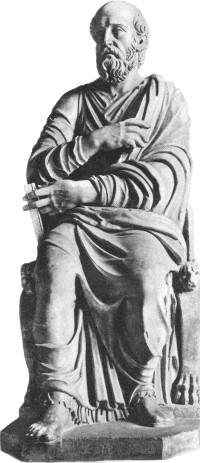podcast 253 – The Apostle Paul a Unitarian
A Congregationalist minister argues that Paul’s theology is unitarian.
A Congregationalist minister argues that Paul’s theology is unitarian.
How and why did American Unitarian Congregationalism die?
 The pagan polytheistic monotheist Celsus presses the attack we looked at last time.
The pagan polytheistic monotheist Celsus presses the attack we looked at last time.
If you [Christians] taught them that Jesus is not his [God’s] Son, but that God is the father of all, all that we really ought to worship him [God] alone, they [Christians] would no longer be willing to listen to you unless you included Jesus as well, who is the author of their sedition. Indeed, when they call him Son of God, it is not because they are paying very great reverence to God, but because they are exalting Jesus greatly. [Origen answers:] We have learnt who the Son of God is, even that he is ‘an effulgence of his glory and the express image of his person’ …and we know that Jesus is the Son come from God and that God is his Father. There is nothing in the doctrine which is not fitting or appropriate to God, that He should cause the existence of an only-begotten Son of this nature. (Against Celsus 8.14, trans. Henry Chadwick, pp. 461-2, bold added)
Celsus pushes the point that a real monotheist would only worship God, and suggests that Christians exalt Jesus at God’s expense. (Never mind how he might reconcile this with his acceptance of traditional polytheism.)
Origen replies Read More »trinitarian or unitarian? 6 – Origen’s Against Celsus – Part 2
 Celsus was a pagan philosopher, essentially a cultural and religious conservative, who wrote a book attacking Christianity, perhaps around 177-80 (though some have argued that it must be no later than 161).
Celsus was a pagan philosopher, essentially a cultural and religious conservative, who wrote a book attacking Christianity, perhaps around 177-80 (though some have argued that it must be no later than 161).
Decades later, it is not clear exactly why, the great Christian scholar Origen (182-254) wrote a massive refutation of this book, quoting substantial portions of it. This is the eight-book Against Celsus, which was probably written aronud 246-8.
There are many, many interesting things in the book. Here’s a quotation relevant to our present series:
[Celsus writes:] If these men [Christians] worshiped no other God but one, perhaps they would have a valid argument against the others. But in fact they worship to an extravagant degree this man who appeared recently [Jesus], and yet think it is not inconsistent with monotheism if they worship His [God’s] servant [Jesus]. [Origen responds:] Read More »trinitarian or unitarian? 5 – Origen’s Against Celsus – Part 1
Kimel lampoons the biblical unitarian historical narrative, and urges that Irenaeus is a big problem for it.
Board members explain their vision for the Unitarian Christian Alliance.
Real arguments vs. pointed questions combined with incredulous tone.
Many who are often spun as “proto-trinitarian” thought the one true God is the Father alone.
In this episode we hear a voice from 1852 describing a lost species of American Christianity:
 Was Hippolytus a trinitarian or a unitarian? In the last two posts, I’ve argued that he was the latter.
Was Hippolytus a trinitarian or a unitarian? In the last two posts, I’ve argued that he was the latter.
In the most recent translation of his Against Noetus, though, the translator thinks he is a trinitarian. He entitles this section, “The three Persons of the Trinity are One God”. (p. 74) Is he right? Here’s the passage, pretty much the whole chapter:
Well then, brethren, all this is what the Scriptures point out to us. This economy that blessed John, too, passes on to us through the witness of his Gospel, and he maintains that this Word is God… [John 1:1]
But then, if the Word, who is God, is with God, someone might well say: “What about this statement that there are two gods?” While I will not say that there are two gods – but rather one – I will say there are two persons; and that a third economy is the grace of the Holy Spirit. For though the Father is one, there are two persons – because there is the Son as well: and the third too, – the Holy Spirit. The Father gives orders, the Word performs the work, and is revealed as Son, through whom belief is accorded to the Father. By a harmonious economy the result is a single God. Read More »trinitarian or unitarian? 11 – a trinitarian passage in Hippolytus?
“The Church, though dispersed throughout the whole world…has received from the apostles and their disciples this faith: in one God, the Father Almighty…”
“…the Son was not ashamed to ascribe the knowledge of that day to the Father only…that we may learn through Him that the Father is above all things.”
What Origen actually says vs. what trinitarians wish that he’d said.
This time, some questions that may occur to you about Clarke’s views on the Trinity.
Does unitarian Christianity “deny the Divinity of Christ,” preach “morality,” and teach salvation by works?
The anti-Calvinist side of early American unitarian Congregationalist Christianity.
A famous manifesto of unitarian Christianity from 1819
 Incredibly, in 1551 they discovered an intact statue of Hippolytus (pictured here). This may exist because he was revered as a martyr shortly after his lifetime.
Incredibly, in 1551 they discovered an intact statue of Hippolytus (pictured here). This may exist because he was revered as a martyr shortly after his lifetime.
In the previous post, we saw that in his theology, the divine (but less divine than God) Logos came to exist from God a finite time ago, so that God could create the cosmos by means of him. On two counts, then, this makes him not a trinitarian – that the “persons” are neither co-equal nor equally divine. But is he a unitarian?
In the most important work we have from him, he says,
The first and only (one God), both Creator and Lord of all, had nothing coeval with Himself… Therefore this solitary and supreme Deity, by an exercise of reflection, brought forth the Logos first… Him alone He produced from existing things; for the Father Himself constituted existence, and the being born from Him was the cause of all things that are produced. The Logos was in the Father Himself, bearing the will of His progenitor, and not being unacquainted with the mind of the Father. For simultaneously with His procession from His Progenitor… He has, as a voice in Himself, the ideas conceived in the Father. …when the Father ordered the world to come into existence, the Logos one by one completed *each object of creation, thus pleasing God. …[God, via the Logos] formed the ruler of all [creation, i.e. Adam]… The Creator did not wish to make him a god, and failed in His aim; nor an angel… but a man. For if He had willed to make thee a god, He could have done so. Thou has the example of the Logos. Read More »trinitarian or unitarian? 10 – Hippolytus on the identity of the one God
I’ve been working on my Trinities book today, and have been reading a lot of Origen (d. c. 253) lately. As is well known, most of his famous On First Principles (kindle, hardback) has been lost in the original Greek, but we have a “complete” copy of a Latin translation made by Rufinus of Aquileia (d. 410) in 398-9. Unfortunately, this translation was made in… Read More »Rufinus’s corruption of Origen’s On First Principles – Part 1